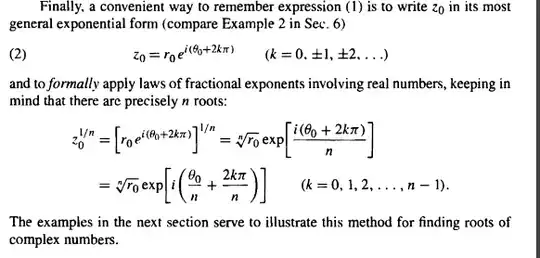I think there's some problems with the notation $\sqrt{-1}$. In fact, using the square root function at all is slightly unnatural, because it's supposed to function as an inverse to the squaring function $x \mapsto x^2$, but the function is not one-to-one. For example, $2^2 = (-2)^2 = 4$, so which number do we set to be "the square root of $4$"? Both are square roots of $4$, with equal claim to that title.
When we are dealing with real numbers, we just decide (somewhat arbitrarily) that positive numbers trump negative numbers. If we take the square root of a positive number, we get a positive root and a negative root, and we decide that the square root is the positive root. That is, if $a \ge 0$, then $\sqrt{a} \ge 0$, always.
This works fine until you come to complex numbers. If we define the complex numbers (in one of the many ways you can define complex numbers), then $-1$ has two roots: $i$ and $-i$. Maybe our first reflex is to choose the positive one, but that's not so simple. There's no "nice", "compatible" ordering of the complex numbers. There's no sense in which $-i \le 0 \le i$, or vice-versa. In fact, even the labelling of $i$ and $-i$ is completely arbitrary; you can simply call the point $(0, -1)$ $i$ instead of $(0, 1)$, and nothing particularly changes in the mathematics.
Or, what about the square roots of another complex number? The square roots of the complex number $8 - 6i$ are $3 - i$ and $-3 + i$. Which one of these is "more positive"? Can we choose, in a consistent, nice way, a value for $\sqrt{z}$, for every $z$, out of each of the two possibilities (well, except $0$ of course)?
Well, people sometimes do choose such a single-valued function $\sqrt{z}$ in various situations, but there is no one, universally-accepted convention. People have to make it clear what $\sqrt{z}$ actually means before they use it.
It might be better to use the slightly less ambiguous $\pm \sqrt{z}$. Even if $\sqrt{z}$ could be one of two values, $\pm \sqrt{z}$ always represents both values. Or, in this case, pick a value for $\sqrt{-1}$ ($i$ or $-i$), and then you can add it to itself, to produce $2i$ or $-2i$, depending on your choice.
 In complex analysis, if $z= r e^{i \theta}$ with $z \neq 0$, then $z^{\frac{1}{n}}=\sqrt[n]{r}\left(e^{i\left(\frac{\theta}{n}+\frac{2k\pi}{n} \right)}\right)\, $ with $k=0,1,2, \cdots, n-1 \,$ and $\sqrt[n]{r}$ is reserved for positive root. From this formula, I got that $z^{\frac{1}{n}}$ is any complex number that has property $(z^{\frac{1}{n}})^{n}=z.$ I know that $i$ has property $i^2=-1$. I will find $(-1)^{\frac{1}{2}}.$
In complex analysis, if $z= r e^{i \theta}$ with $z \neq 0$, then $z^{\frac{1}{n}}=\sqrt[n]{r}\left(e^{i\left(\frac{\theta}{n}+\frac{2k\pi}{n} \right)}\right)\, $ with $k=0,1,2, \cdots, n-1 \,$ and $\sqrt[n]{r}$ is reserved for positive root. From this formula, I got that $z^{\frac{1}{n}}$ is any complex number that has property $(z^{\frac{1}{n}})^{n}=z.$ I know that $i$ has property $i^2=-1$. I will find $(-1)^{\frac{1}{2}}.$
I know from complex variable that √-1 equals i or −iYou know wrong, or you misquote what you know right. It would help if you first stated what definitions you use for $\sqrt{-1}$ and $i$. – dxiv Aug 29 '18 at 04:19√n(r) is reserved for positive rootSorry, but this makes no sense. $,\sqrt[n]{-1},$ has no "positive" root to begin with.I know that (−1)^1/2 can be i or −iThat still makes no sense until you spell out what definitions you use for(-1)^1/2andi. – dxiv Aug 30 '18 at 05:34